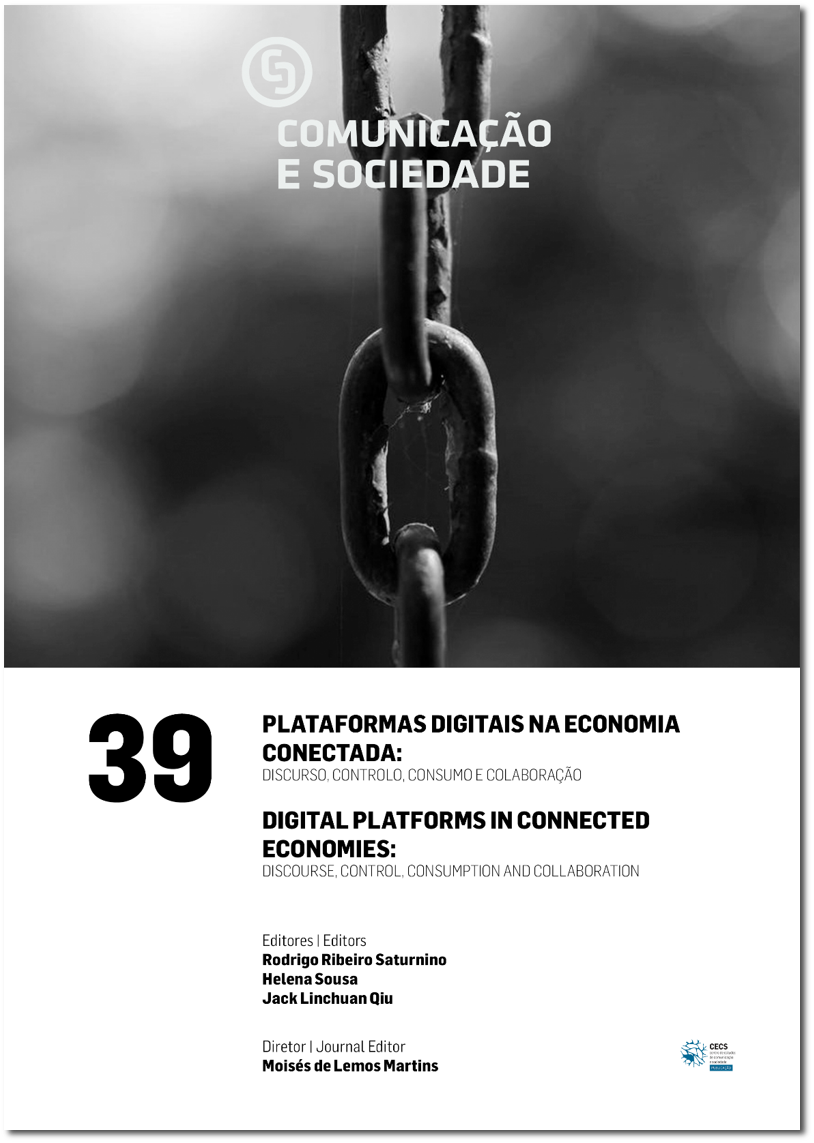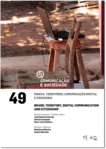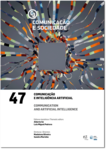As Estratégias de Comunicação das Plataformas de Trabalho: Circulação de Sentidos nas Mídias Sociais das Empresas no Brasil
DOI:
https://doi.org/10.17231/comsoc.39(2021).2879Palavras-chave:
Brasil, circulação de sentidos, comunicação, trabalho em plataformasResumo
Este artigo tem o objetivo de analisar como as plataformas de entrega e transporte no Brasil construíram seu ethos nas mídias sociais, no contexto da primeira greve dos trabalhadores dessas empresas, dentro do cenário da pandemia de coronavírus. Argumentamos, a partir da noção de circulação de sentidos, como a construção do ethos das plataformas é um elemento sígnico da luta de classes e uma dimensão do papel da comunicação na plataformização do trabalho. Conduzimos análise do conteúdo veiculado em mídias sociais (Instagram, Facebook, Twitter e YouTube) de duas plataformas de entrega (iFood e Rappi) e duas de transporte (Uber e 99), as principais do país. As categorias de análise são: “pandemia e saúde” (dimensão contextual em relação à crise sanitária); “cidadania e diversidade” (dimensão recorrente no discurso produzido pelas plataformas, em linha com a literatura da área), “relações com marcas e influenciadores” (trabalho de visibilidade das plataformas com públicos interessados específicos) e “representações dos trabalhadores” (como elemento central da dimensão sígnica da luta de classes). Em linhas gerais, as estratégias de comunicação das plataformas, focadas nos consumidores, apresentam sentidos de caridade, filantropia, cidadania e diversidade, dizendo-se abertas às demandas dos trabalhadores. As reivindicações dos trabalhadores são ressignificadas a partir de um olhar de cidadania sacrificial, autoajuda, empreendedorismo e superação. Os resultados mostram como a comunicação das plataformas nas mídias sociais jogam um papel central nas contradições de classes.
Downloads
Referências
Abidin, C. (2016). Visibility labour: Engaging with influencers’ fashion brands and #OOTD advertorial campaigns on Instagram. Media International Australia, 161(1), 86–100. https://doi.org/10.1177/1329878X16665177
Abílio, L. (2015). Sem maquiagem: O trabalho de um milhão de revendedoras de cosméticos. Boitempo.
Abílio, L., Almeida, P., Amorim, H., Cardoso, A. C., Fonseca, V., Kalil, R., & Machado, S. (2020). Condições de trabalho de entregadores via plataforma digital durante a covid-19. Revista Jurídica Trabalho e Desenvolvimento Humano, 3, 1–21. https://doi.org/10.33239/rjtdh.v.74
Abílio, L., Grohmann, R., & Weiss, H. (2021). Struggles of delivery workers in Brazil: Working conditions and collective organization during the pandemic. Journal of Labor and Society. Publicação eletrónica antecipada. https://doi.org/10.1163/24714607-bja10012
Alacovska, A., & Gill, R. (2019). De-westernizing creative labour studies: The informality of creative work from an ex-centric perspective. International Journal of Cultural Studies, 22(2), 195–212. https://doi.org/10.1177/1367877918821231
Aliança Bike. (2019). Pesquisa de perfil de entregadores ciclistas de aplicativo. https://aliancabike.org.br/wp-content/uploads/2020/04/relatorio_s2.pdf
Amorim, H., & Moda, F. (2020). Work by app: Algorithmic management and working conditions of Uber drivers in Brazil. Work Organisation, Labour & Globalisation, 14(1), 101–118. https://doi.org/10.13169/workorgalaboglob.14.1.0101
Atanasoski, N., & Vora, K. (2019). Surrogate humanity: Race, robots, and the politics of technological futures. Duke University Press.
Baccega, M. (1995). Palavra e discurso: História e literatura. Ática.
Bakhtin, M. (1979). The aesthetics of verbal art. Iskusstvo.
Brown, W. (2016). Sacrificial citizenship: Neoliberalism, human capital, and austerity politics. Constellations, 23(1), 3–14. https://doi.org/10.1111/1467-8675.12166
Bucher, T., & Helmond, A. (2018). The affordances of social media platforms. Sage handbook of social media. Sage.
Cant, C. (2019). Riding for deliveroo: Resistance in the new economy. John Wiley & Sons.
Casaqui, V., & Riegel, V. (2016). Management of happiness, production of affects and the spirit of capitalism: International narratives of transformation from Coca-Cola brand. The Journal of International Communication, 22(2), 293–314. https://doi.org/10.1080/13216597.2016.1194304
Casilli, A. (2019). En attendant les robots: Enquête sur le travail du clic. Seuil.
Casilli, A., & Posada, J. (2019). The platformization of labor and society. In. M. Graham & W. Dutton (Eds.), Society and the internet: How networks of information and communication are changing our lives (pp. 293–306). Oxford University Press.
Castellano, M. (2018). Vencedores e fracassados: O imperativo do sucesso na cultura da autoajuda. Appris.
Chen, J. Y., & Qiu, J. L. (2019). Digital utility: Datafication, regulation, labor, and Didi’s platformization of urban transport in China. Chinese Journal of Communication, 12(3), 274-289. https://doi.org/10.1080/17544750.2019.1614964
Codagnone, C., Karatzogianni, A., & Matthews, J. (2016). Platform economics: Rhetoric and reality in the ‘sharing economy’. Emerald Publishing. https://doi.org/10.1108/9781787438095
Cordero, K., & Daza, C. (2020). Precarización laboral em plataformas digitales: Una lectura desde América Latina. Friedrich-Ebert-Stiftung Ecuador FES-ILDIS.
Costanza-Chock, S. (2020). Design justice. MIT Press.
Couldry, N., & Mejias, U. A. (2019). Data colonialism: Rethinking big data’s relation to the contemporary subject. Television & New Media, 20(4), 336–349. https://doi.org/10.1177/1527476418796632
Dardot, P., & Laval, C. (2013). The new way of the world: On neoliberal society. Verso.
Davis, M., & Xiao, J. (2021). De-westernizing platform studies: History and logics of Chinese and U.S. platforms. International Journal of Communication, 15, 103–122. https://ijoc.org/index.php/ijoc/article/view/13961
Dubal, V. (2019). An Uber ambivalence: Employee status, worker perspectives, & regulation in the gig economy. Political Science. Publicação eletrónica antecipada. https://doi.org/10.2139/ssrn.3488009
Dyer-Witheford, N., Kjosen, A., & Steinhoff, J. (2019). Inhuman power: Artificial intelligence and the future of capitalism. Pluto Press.
Englert, S., Woodcock, J., & Cant, C. (2020). Digital workerism: Technology, platforms, and the circulation of workers’ struggles’. tripleC: Communication, Capitalism & Critique, 18(1), 132–145. https://doi.org/10.31269/triplec.v18i1.1133
Fairwork. (2019). The five pillars of Fairwork: Labour standards in the platform economy. https://fair.work/wp-content/uploads/sites/97/2019/10/Fairwork-Y1-Report.pdf
Fairwork. (2020). The gig economy and covid-19: Fairwork report on platform policies. http://fair.work/wp-content/uploads/sites/97/2020/09/COVID-19-Report-September-2020.pdf
Figaro, R. (2018). Comunicação e trabalho: Implicações teórico-metodológicas. Galáxia, (39), 177–189. https://doi.org/10.1590/1982-255435905
Frenken, K., & Schor, J. (2017). Putting the sharing economy into perspective. Environmental Innovation and Societal Transitions, 3–10. https://doi.org/10.1016/j.eist.2017.01.003
Gibbings, S., & Taylor, J. (2019). A desirable future: Uber as image-making in winnipeg. Communication, Culture and Critique, 12(4), 570–589. https://doi.org/10.1093/ccc/tcz026
Goux, J. (1973). Économie et symbolique: Freud, Marx. Éditions de Seuil.
Graham, M. (Ed.). (2019). Digital economies at global margins. MIT Press.
Graham, M., & Anwar, M. (2019). The global gig economy: Towards a planetary labour market? First Monday, 24(4). https://doi.org/10.5210/fm.v24i4.9913
Grohmann, R. (2018). Signos de classe: Sobre a circulação das classes sociais nos processos comunicacionais. Rumores, 12(24), 293–312. https://doi.org/10.11606/issn.1982-677X.rum.2018.142047
Grohmann, R., & Qiu, J. (2020). Contextualizing platform labor. Contracampo, 22(1), 1–15. https://doi.org/10.22409/contracampo.v39i1.42260
Hall, S. (1997). Representation: Cultural representations and signifying practices. Sage.
Howson, K., Ustek-Spilda, F., Grohmann, R., Salem, N., Carelli, R., Abs, D., Salvagni, J., Graham, M., Balbornoz, M., Chavez, H., Arriagada, A., & Bonhomme, M. (2020). ‘Just because you don’t see your boss, doesn’t mean you don’t have a boss’: Covid-19 and gig worker strikes across Latin America. International Union Rights, 20(3), 20–28. https://doi.org/10.14213/inteuniorigh.27.3.0020
Huws, U. (2014). Labor in the global digital economy: The cybertariat comes of age. Monthly Review Press.
Huws, U. (2020). Reinventing the welfare state: Digital platforms and public policies. Pluto Press.
iFood. (s.d.). Sobre iFood. https://institucional.ifood.com.br/ifood
Illouz, E. (2007). Cold intimacies: The making of emotional capitalism. Polity Press.
Karatzogianni, A., & Matthews, J. (2020). Platform ideologies: Ideological production in digital intermediation platforms and structural effectivity in the “sharing economy”. Television & New Media, 21(1), 95–114. https://doi.org/10.1177/1527476418808029
Lazar, T., Ribak, R., & Davidson, R. (2020). Mobile social media as platforms in workers’ unionization. Information, Communication & Society, 23(3), 437–453. https://doi.org/10.1080/1369118X.2018.1510536
Leaver, T., Highfield, T., & Abidin, C. (2020). Instagram: Visual social media cultures. Polity.
Liu, W. (2020). Abolish Silicon Valley. Penguin.
Maingueneau, D. (2001). Análise de textos de comunicação. Cortez.
Marazzi, C. (2011). Capital and affects: The politics of the language economy. Semiotext(e).
Morozov, E., & Bria, F. (2018). Rethinking smart cities: Democratizing urban technology. Rosa Luxemberg Stifung.
Mosco, V. (2009). The political economy of communication (2.ª ed.). Sage.
(s.d.). Sobre a 99. https://carreiras.99app.com/sobre-a-99/
Pasquale, F. (2016). Two narratives of platform capitalism. Yale Law and Policy Review, 35(1), 309–319. https://ylpr.yale.edu/two-narratives-platform-capitalism
Plantin, J. C., Lagoze, C., Edwards, P. N., & Sandvig. C. (2018). Infrastructure studies meet platform studies in the age of Google and Facebook. New Media & Society, 20(1), 293–310. https://doi.org/10.1177/1461444816661553
Poell, T., Nieborg, D., & van Dijck, J. (2019). Platformisation. Internet Policy Review, 8(4). https://doi.org/10.14763/2019.4.1425
Popescu, G. H., Petrescu, E., & Sabie, O. (2018). Algorithmic labor in the platform economy: Digital infrastructures, job quality, and workplace surveillance. Economics Management and Financial Markets, 13(3), 74–79. https://doi.org/10.22381/EMFM13320184
Qiu, J. L., Gregg, M., & Crawford, K. (2014). Circuits of labour: A labour theory of the iPhone era. TripleC: Communication, Capitalism & Critique, 12(2), 564–581. https://doi.org/10.31269/triplec.v12i2.540
Rosenblat, A. (2018). Uberland: How algorithms are rewriting the rules of work. University of California Press
Rossi-Landi, F. (1973). Il linguaggio come lavoro e come mercato. Bompiani.
Sadowski, J. (2020). The internet of landlords: Digital platforms and new mechanisms of rentier capitalism. Antipode, 52(2), 337–338. https://doi.org/10.1111/anti.12595
Scholz, T. (2016). Uberworked and underpaid: How workers are disrupting the digital economy. Polity Press.
Schor, J. B., Attwood-Charles, W., Cansoy, M., Ladegaard, I., & Wengronowitz, R. (2020). Dependence and precarity in the platform economy. Theory and Society, 49, 833–861. https://doi.org/10.1007/s11186-020-09408-y
Schradie, J. (2015). Political ideology, social media, and labor unions: Using the internet to reach the powerful, not mobilize the powerless. International Journal of Communication, 9, 1985–2006. https://ijoc.org/index.php/ijoc/article/view/3384/1413
Scolere, L., Pruchniewska, U., & Duffy B. E. (2018). Constructing the platform-specific self-brand: The labor of social media promotion. Social Media + Society,4(3), 1–11. https://doi.org/10.1177/2056305118784768
Silverstone, R. (1999). Why study media? Sage.
Sodré, M. (2019). The science of the commons: Note on communication methodology. Palgrave.
Soriano, C., & Cabañes, J. (2020). Entrepreneurial solidarities: Social media collectives and Filipino digital platform workers. Social Media + Society, 6(2) 1–11. https://doi.org/10.1177/2056305120926484
Srnicek, N. (2016). Platform capitalism. John Wiley & Sons.
Sun, P. (2019). Your order, their labor: An exploration of algorithms and laboring on food delivery platforms in China. Chinese Journal of Communication, 12(3), 308–323. https://doi.org/10.1080/17544750.2019.1583676
Uber. (s.d.). Cidadania global. https://www.uber.com/br/pt-br/community/
Uber. (2020). Carnaval 2020: Uber lança campanha para reforçar respeito. https://www.uber.com/pt-BR/newsroom/carnaval-2020-uber-lanca-campanha-para-reforcar-respeito/
van Dijck, J, Poell, T., & De Waal, M. (2018). The platform society: Public values in a connective world. Oxford University Press.
van Doorn, N. (2017). Platform labor: On the gendered and racialized exploitation of low-income service work in the ‘on-demand’ economy. Information, Communication & Society, 20(6), 898–914. https://doi.org/10.1080/1369118X.2017.1294194
Voloshinov, V. N. (1973). Marxism and the philosophy of language. Seminar Press.
Wajcman, J. (2019). How Silicon Valley sets time. New Media & Society, 21(6), 1–18. https://doi.org/10.1177/1461444818820073
Williams, R. (2005). Culture and materialism. Verso Books.
Wood, A., Graham, M., Lehdonvirta, V., & Hjorth, I. (2019). Good gig, bad gig: Autonomy and algorithmic control in the global gig economy. Work, Employment & Society, 33(1), 56–75. https://doi.org/10.1177/0950017018785616
Wood, A., Lehdonvirta, V., & Graham, M. (2018). Workers of the internet unite? Online freelancer organisation among remote gig economy workers in six Asian and African countries. New Technology, Work & Employment, 33(2), 95–112. https://ssrn.com/abstract=3211803
Wood, D. M., & Monahan, T. (2019). Platform surveillance. Surveillance & Society, 17(1/2), 1–6. https://doi.org/10.24908/ss.v17i1/2.13237
Woodcock, J. & Graham, M. (2019). The gig economy: A critical introduction. Polity.
Downloads
Publicado
Como Citar
Edição
Secção
Licença
Direitos de Autor (c) 2021 Comunicação e Sociedade

Este trabalho encontra-se publicado com a Creative Commons Atribuição-NãoComercial 4.0.
Os autores são titulares dos direitos de autor, concedendo à revista o direito de primeira publicação. O trabalho é licenciado com uma Licença Creative Commons - Atribuição 4.0 Internacional.











